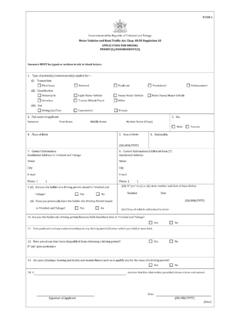Transcription of DRAFT POLICY DOCUMENT FOR AMENDING THE LEGISLATIVE ...
1 20 POLICY For: AMENDING the LEGISLATIVE Framework Governing the Fixed Penalty Traffic Ticketing System and The Introduction of a Demerit Points System in Trinidad and Tobago Ministry of Works and Transport Legal Services Unit 9th June, 2016 1 Legal Services Unit, Ministry of Works and Transport Table of Contents EXECUTIVE SUMMARY .. 2 INTRODUCTION .. 4 OBJECTIVES OF THE POLICY .. 7 ESSENTIAL FEATURES OF THE PROPOSED DEMERIT POINTS SYSTEM IN TRINIDAD AND TOBAGO .. 8 FIXED PENALTY TICKETING SYSTEM .. 13 KEY RECOMMENDATIONS FOR REFORM OF THE TICKETING SYSTEM .. 17 CONCLUSION .. 20 APPENDIX A .. 21 APPENDIX B .. 29 2 Legal Services Unit, Ministry of Works and Transport EXECUTIVE SUMMARY 1. The Ministry of Works and Transport (MOWT) bears the responsibility for the continued development and implementation of traffic law enforcement measures and strategies for the regulation of road use and promotion of road safety in Trinidad and Tobago.
2 In the view of the MOWT, it has become necessary to implement a system of Demerit Points, which is aimed at engendering greater responsibility by those who drive on the nation s roads, by imposing a robust change of the attitudes and cultural behaviour of motorists towards road safety. 2. The proposed Demerit Points System initiative would allow for demerit points to be ascribed to a person s driver s licence, where a driver was issued with a fixed penalty notice or, convicted by a Court for a traffic violation under the Motor Vehicles and Road Traffic Act, Ch. 48:50. 3. Further, from an assessment of the current legislation, it is considered necessary that practical and modern amendments be made to the current Motor Vehicles and Road Traffic Act, Ch.
3 48:50. Additionally, the Ministry is proposing to have the Motor Vehicles and Road Traffic (Enforcement and Administration) Act, Ch. 48:52 repealed and anchored into the Motor Vehicles and Road Traffic Act, Ch. 48:50 in line with the approach adopted under the Motor Vehicle and Road Traffic Bill, 2016. Aligned with the consolidation of these two pieces of legislation, would be the incorporation of new LEGISLATIVE provisions for: New, convenient and flexible methods of payment for fixed penalties at any State Bank or online; The introduction of a Notice of Contest , where a driver wishes to contest a fixed penalty ticket before the Court; Imposition of non-conventional sanctions by the Court for non-payment of tickets, for example, a court order instructing the Licensing Authority to prohibit all transactions with the traffic offender until the fine for the fixed penalty violation has been paid in full.
4 And The use of technology to provide seamless connectivity and real time information sharing of drivers records between the Licensing Authority, the Courts and the Trinidad and Tobago Police Service (TTPS). 3 Legal Services Unit, Ministry of Works and Transport 4. The Ministry examined the legal framework of other Commonwealth jurisdictions that have similar demerit points systems to determine the key features which are necessary for the successful operation of a demerit points system in Trinidad and Tobago. These jurisdictions included Australia (South Australia), Canada (the province of Alberta), Jamaica and the United Kingdom. 4 Legal Services Unit, Ministry of Works and Transport 1.
5 INTRODUCTION A system of Demerit Points within the framework of traffic law enforcement, will be aimed at engendering greater responsibility in those who drive on the nation s roads, by imposing a regime that will bring about a robust change in attitudes and encultured behaviour of motorists with respect to road safety awareness. In many developed countries around the world, similar systems have proven effective in ensuring that citizens, who earn the privilege of driving when issued with a driver s permit, conduct themselves in a manner that does not pose a safety hazard to themselves and other road users. The proposed system, once effectively managed, will equip the Licensing Authority with the requisite information and empirical data, to exercise its new statutory powers to suspend the driver s permit of a habitually errant driver.
6 This is made possible as the Demerit Points System assesses individual driving records for breaches of traffic laws and indicates when a driver should be barred from the privilege of driving on the nation s roadways, for a period of time. The number of road accidents and road fatalities in Trinidad and Tobago continues to occur at an alarming rate. Notwithstanding this, the Ministry has already noted a downward trend in the incidents of road fatalities since the introduction of speed guns. However, there is still much room for improvement, and the Ministry s objective is to aggressively pursue a package of key LEGISLATIVE initiatives that will place Trinidad and Tobago on the path to being ranked among countries that have the safest roads and highways.
7 The Ministry is also of the belief that these LEGISLATIVE interventions will further assist in reducing the unacceptable state of general lawlessness permeating our society, since many serious crimes are committed with the use of vehicles on our roads. Towards this end, it is felt that the State has not done enough over the years to implement adequate measures that provide modern tools and procedures to facilitate effective enforcement of the traffic laws. Admittedly, some significant progress was made by the introduction of breathalyser and speed gun laws into our law enforcement landscape. However, Trinidad and Tobago continues to seriously lag behind with regard to the robust updating and review of its traffic laws, to ensure the safety of its citizens and to restore a sense of order on the nation s road network.
8 The unfortunate end result of this inaction is unbridled lawlessness on our roadways and high levels of road accidents, injuries and fatalities. These occurrences deprive our nation of the full potential of many bright and resourceful citizens, while placing psychological stress on law-abiding citizens, who make daily use of the nation s road network. In addition, incalculable man hours, finances and resources are lost as a consequence of the 5 Legal Services Unit, Ministry of Works and Transport diversion of the energies of State agencies, as well as the general citizenry, whenever any road traffic accident occurs. In a Trinidad Express article dated April 21, 2016,1 it was highlighted that in 2015, there were 127 fatal road accidents, in which 146 persons lost their lives.
9 Sharon Inglefield, President of the local non-governmental group Arrive Alive was reported to have stated that, speeding accounts for 55% of road fatalities in Trinidad and Tobago. In the year 2000, an attempt was made to introduce a Demerit Points regime in Trinidad and Tobago, via an amendment to the Motor Vehicles and Road Traffic Act2. Unfortunately, this amendment contemplated the enactment of specific regulations by the President, in order for such a system to be operationalised. To date, no such regulations have been introduced and the matter has not received priority treatment for the last sixteen (16) years. It must be stated however, that following an assessment of the experiences of other Commonwealth jurisdictions, including our CARICOM neighbour Jamaica, the Ministry holds the firm view that a Demerit Points System does not require the enactment of special regulations in order to be operationalised.
10 The system can be achieved via a simple amendment to the parent Motor Vehicles and Road Traffic Act. The contemplation of regulations in accordance with the provisions of the Motor Vehicles and Road Traffic (Amendment) Act, 21 of 2000 was therefore ill-conceived and played a major role in delaying the implementation of the system in this country. Another related area of profound concern and historical LEGISLATIVE neglect, is the country s Fixed Penalty Ticketing System. In 1979, the Fixed Penalty System was introduced in Trinidad and Tobago by the enactment of the Motor Vehicles and Road Traffic (Enforcement and Administration Act) Chapter 48:52. Its main purpose was to provide a convenient opportunity to drivers charged for prescribed offences under the Motor Vehicles and Road Traffic Act, to pay a lower fixed penalty fine into Court and thereby avoid the inconvenience of attending Court and the possible imposition of the maximum prescribed fine for the particular offence3.





